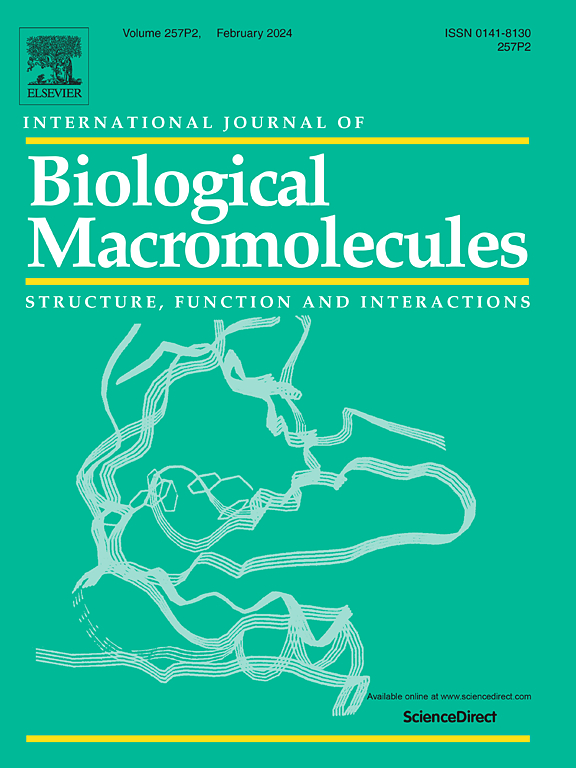Polydeoxyribonucleotide-spermidine nanoparticles: Preparation, characterization, and verification of skin anti-aging efficacy
IF 8.5
1区 化学
Q1 BIOCHEMISTRY & MOLECULAR BIOLOGY
International Journal of Biological Macromolecules
Pub Date : 2025-08-19
DOI:10.1016/j.ijbiomac.2025.146984
引用次数: 0
Abstract
Regenerative medicine, with stem cells and tissue engineering as its core, is dedicated to the regeneration of skin and organs and the treatment of diseases. Polydeoxyribonucleic acid (PDRN) has been demonstrated to promote skin regeneration and anti-aging in the field of regenerative medicine, yet its application is constrained by its inherent characteristics, including its high electronegativity, poor transdermal delivery, low transmembrane and susceptibility to degradation. Spermidine is a trivalent molecule with a variety of biological activities, including autophagy induction, cell regeneration and free radical scavenging. Herein, PDRN was innovatively coagulated into nanoparticles with spermidine to construct nucleic acid delivery vehicles (PDRN-NPs), and the preparation process was optimized and characterized in multiple dimensions, resulting in homogeneous PDRN-NPs with an average particle size of 201.9 ± 5.3 nm, which were able to be enriched in the periphery of fibroblasts, and the phagocytosis capacity of macrophages was significantly increased by 96 % and the expression of cellular mitochondrial ATP was increased by 46.14 %. PDRN-NPs have been demonstrated to potently inhibit the expression of TNF-α, IL-6 and MMP-1, while concomitantly promoting the expression of the NRG1 protein. Furthermore, PDRN-NPs have been shown to enhance cell migration by 25.63 %, increased in vitro percutaneous permeability by 202.3 % and in vivo permeability by 143.4 %. Concurrently, the human efficacy evaluation demonstrated that PDRN-NPs could enhance the structure and function of the skin from multiple levels, exhibiting specific anti-skin aging efficacy. This study provides a theoretical and experimental basis for the application of nucleic acid drug delivery and cosmetics, and promote the development of regenerative medicine fields.
聚脱氧核糖核苷酸-亚精胺纳米颗粒:皮肤抗衰老功效的制备、表征和验证
再生医学以干细胞和组织工程为核心,致力于皮肤和器官的再生以及疾病的治疗。聚脱氧核糖核酸(PDRN)在再生医学领域已被证明具有促进皮肤再生和抗衰老的作用,但其固有的电负性高、透皮传递性差、跨膜性低、易降解等特性限制了其应用。亚精胺是一种三价分子,具有多种生物活性,包括诱导自噬、细胞再生和清除自由基。本研究创新性地利用亚精胺将PDRN凝聚成纳米颗粒构建核酸递送载体(PDRN- nps),并对制备工艺进行了优化和多维表征,得到了平均粒径为201.9±5.3 nm的均匀PDRN- nps,该PDRN- nps能够在成纤维细胞外周富集。巨噬细胞的吞噬能力显著提高96%,细胞线粒体ATP表达增加46.14%。PDRN-NPs已被证明能有效抑制TNF-α、IL-6和MMP-1的表达,同时促进NRG1蛋白的表达。此外,PDRN-NPs已被证明能促进细胞迁移25.63%,体外透皮通透性提高202.3%,体内通透性提高143.4%。同时,人体功效评价表明,PDRN-NPs可以从多个层面增强皮肤的结构和功能,具有特异性的抗皮肤衰老功效。本研究为核酸给药和化妆品的应用提供理论和实验依据,促进再生医学领域的发展。
本文章由计算机程序翻译,如有差异,请以英文原文为准。
求助全文
约1分钟内获得全文
求助全文
来源期刊
CiteScore
13.70
自引率
9.80%
发文量
2728
审稿时长
64 days
期刊介绍:
The International Journal of Biological Macromolecules is a well-established international journal dedicated to research on the chemical and biological aspects of natural macromolecules. Focusing on proteins, macromolecular carbohydrates, glycoproteins, proteoglycans, lignins, biological poly-acids, and nucleic acids, the journal presents the latest findings in molecular structure, properties, biological activities, interactions, modifications, and functional properties. Papers must offer new and novel insights, encompassing related model systems, structural conformational studies, theoretical developments, and analytical techniques. Each paper is required to primarily focus on at least one named biological macromolecule, reflected in the title, abstract, and text.

 求助内容:
求助内容: 应助结果提醒方式:
应助结果提醒方式:


